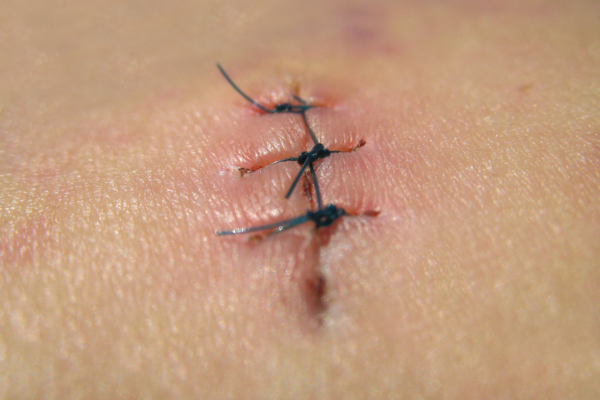Gut health, collagen and the ability to heal scars and wounds

The Connection Between Gut Health, Collagen, and Scar/Wound Healing: A Deep Dive into the Body's Repair System
Introduction
Gut health, collagen, and the ability to heal scars and wounds are all closely linked, but are often overlooked in traditional medicine. The gut, as one of the body’s most vital organs, is central not only to digestion and the immune system, but also to the body’s repair system. Collagen, on the other hand, is a protein structure that plays a crucial role in tissue healing and skin elasticity. Understanding the connection between gut health, collagen production, and wound healing is important for optimizing the body’s ability to heal and preventing complications from scarring.
This article will explore how the gut microbiome influences collagen production and how this interaction is crucial for an effective scar and wound healing process. By looking at the underlying mechanisms, we will understand why a healthy gut can contribute to faster and better healing, while a disturbed gut flora can lead to slower healing and more noticeable scars.
1. Gut Health and Collagen: An Overview
To understand the connection between gut health and collagen production, we need to start by looking at what the gut does for the body and what collagen is.
1.1 The Role of the Intestine in the Body
The gut is more than just an organ for digestion. It is also an important part of the immune system and affects the body's ability to heal. A healthy gut microbiome is crucial to ensuring efficient digestion and proper absorption of nutrients. The gut lining, which is made up of a variety of cell types, is also responsible for keeping harmful microorganisms at bay, protecting the body from infection and inflammation.
When the gut microbiome is in balance, the body receives the necessary nutrients needed to repair damaged tissues. However, an imbalance in the microbiome (dysbiosis) can lead to a variety of health problems, including inflammation, infections, and impaired wound healing.
1.2 Collagen: The Building Block of Tissue Healing
Collagen is the most abundant protein in the body and is found in the skin, bones, tendons, ligaments and blood vessels. It is also an important component of connective tissue. Collagen functions as a structural protein that gives tissues strength, elasticity and integrity. During the healing process, collagen plays a central role in building new tissue and repairing damage to the skin and other organs.
Collagen production is a complex process that involves various nutrients, including vitamin C, zinc, and amino acids like glycine and proline. Gut health is crucial for these nutrients to be absorbed and transported efficiently to the areas that need them to stimulate collagen production.
2. The Impact of Gut Health on Collagen Production
For collagen production to function optimally, a good nutritional supply and a healthy intestinal flora are required. There is a direct connection between the health of the intestine and the ability to produce collagen, as the intestine is responsible for breaking down and absorbing the nutrients the body needs for this process.
2.1 The Impact of the Microbiome on Collagen Production
A healthy gut flora with a diverse microbiome contributes to efficient nutrient absorption. The bacteria in the gut help break down complex nutrients such as proteins, carbohydrates and fats, allowing the body to absorb important vitamins and minerals necessary for collagen production.
An imbalance in gut flora, or dysbiosis, can prevent the proper absorption of important nutrients. This can result in nutritional deficiencies and thus inhibit the body's ability to produce collagen. For example, vitamin C and the amino acids glycine and proline are important for collagen production, and if these are not properly absorbed, the healing process can be delayed.
Additionally, an unhealthy gut flora can lead to increased levels of systemic inflammation in the body, which can also negatively impact collagen production. Inflammation has been shown to affect the integrity of collagen and can even lead to the breakdown of collagen in tissues, hindering the healing process.
2.2 The Gut Microbiome and the Immune System
The gut is home to a large portion of the body’s immune cells, and the microbiome plays a crucial role in regulating the immune system. When the gut is healthy, it can support a balanced immune system that helps fight infections and inflammatory conditions. A balanced immune system is also important for stimulating healing processes and collagen production.
If the gut microbiome is out of balance, it can lead to an overactive immune system and systemic inflammation, which can prolong or impair the wound healing process. Dysbiosis has been shown to affect the production of inflammatory cytokines and other molecules involved in tissue repair and collagen synthesis. In chronic inflammation, collagen production can become dysregulated, which can lead to weakened tissue and slower healing.
3. Scar and Wound Healing: How Collagen Plays a Central Role
Wound healing is a very complex process involving several phases: hemostasis (blood clotting), inflammation, proliferation (tissue repair), and tissue remodeling. Collagen is the main building block of the tissue produced during the healing process, and it plays a central role in all of these phases.
3.1 The Role of Collagen in Phases of Wound Healing
-
Hemostasis : When an injury occurs, the first step is blood clotting. Here, collagen plays an important role in creating a blood clot that closes the wound and prevents bleeding.
-
Inflammation : During the inflammatory phase, the wound is cleansed, where immune cells and other molecules help remove dead tissue and prevent infection. Collagen acts as a structure to support cell migration and repair.
-
Proliferation : During this phase, new tissue formation occurs. Collagen is one of the first proteins produced, and it forms a network of fibers that supports new tissue formation and helps the wound heal.
-
Tissue remodeling : After the new tissue layer has formed, long-term remodeling occurs where the collagen fibers are arranged to provide maximum strength and flexibility. Optimal collagen production is crucial to reduce scarring and ensure functional and durable tissue.
3.2 The Importance of Collagen for Skin Recovery
Collagen production in the skin is crucial for wound healing and for maintaining skin elasticity and strength. During the healing process, the collagen phase is formed, which quickly forms a network to repair damaged tissue. When the body has difficulty producing collagen due to nutritional deficiencies or other factors, the healing process can be delayed and result in larger or more visible scars.
4. How Disturbed Gut Health Impairs Scar and Wound Healing
Dysbiosis, or an imbalanced gut flora, can have a negative impact on wound healing. When the gut is not functioning optimally, both nutrient absorption and the immune system are affected. This can lead to impaired collagen production and slower healing of both superficial and internal wounds.
4.1 Inflammation and Immune System
Dysbiosis can cause chronic low-grade inflammation, which affects the body's ability to effectively heal wounds. Inflammation can inhibit collagen production and lead to excessive scarring. A weak or unbalanced immune system can also lead to an increased risk of wound infections, further delaying healing.
4.2 Nutritional Deficiency and Gut Health
When the gut is dysfunctional, the body may have difficulty absorbing important nutrients necessary for collagen production. Deficiencies in vitamin C, zinc, and amino acids can all contribute to weakened collagen production and impaired wound healing.
5. Summary and Conclusions
Gut health is central to the body's ability to heal wounds and repair damaged tissue, and a disrupted gut flora can have a negative impact on collagen production and wound healing. By maintaining a healthy gut flora and ensuring that the gut is functioning optimally, you can promote better collagen production and faster healing of injuries.
To optimize both gut health and collagen production, it is important to eat a balanced diet rich in nutrients, especially those that support collagen production such as vitamin C, zinc, and amino acids. Avoiding inflammatory foods and stress, as well as giving the body time to recover, is also crucial to supporting the healing process and preventing excessive scarring.
Gut health and collagen are thus closely linked and play a central role in the body's ability to heal and repair itself. By understanding this connection, we can improve our health and promote rapid and effective healing of wounds and injuries.







